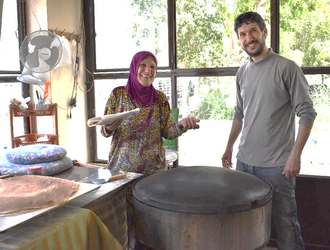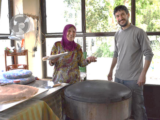Management Skills Help Small Businesses in Lebanon Amid COVID-19

To mark “Micro-, Small, and Medium-sized Enterprises Day” on 27 June, Palladium’s Bethany O’Connor shares the stories of Lebanese entrepreneurs keeping their businesses alive during the coronavirus pandemic.
Khouloud Hanna is a fitness trainer and owner of a small gym in a West Bakaa village. Like many proprietors, she closed her business due to COVID-19 and has had to find a way to adapt it to the new reality.
Applying her customer service and marketing skills, Khouloud has pivoted her business to provide online fitness classes via Zoom, and as a result, has managed to expand her clientele well beyond the village. Now, people from all over Lebanon and around the world attend her classes.
Mariam Srour owns a bakery with her son, Ali, who is visually impaired. When COVID-19 caused a national lockdown of most public and private sector organisations, Mariam began focusing on providing large quantities of half-baked and frozen dough to local restaurants, allowing them to fill their clients’ orders for home delivery. This change in strategy not only helped Mariam stay in business, but also supported the restaurants in her community to remain open and retain their staff.
Both Khouloud and Mariam have been able to adapt using the skills they developed through the Livelihoods and Inclusive Finance Expansion Project (LIFE), funded by USAID. LIFE has assisted the owners of many micro-businesses (with fewer than three employees including the proprietor) and a few small businesses to survive the current crisis and continue to serve their communities.
Small Businesses Are Essential
Micro-, small, and medium-sized enterprises (MSMEs) comprise more than 90% of all firms worldwide, account for roughly 70% of total employment and 50% of GDP, and are essential to achieving the U.N. Sustainable Development Goals.
Businesses with fewer than 250 employees can be both agile and vulnerable in the face of changing circumstances. In comparison with their larger competitors, MSMEs tend to have more trouble accessing finance, navigating trade-related procedures, and identifying market opportunities.
COVID-19 poses yet another challenge for small businesses worldwide, some of which were already in turmoil from recession and other financial stresses. This challenge is particularly acute in emerging markets, where small businesses create most of the formal jobs.
“MSMEs tend to employ a larger share of the vulnerable sectors of the workforce, such as women, youth, and people from poorer households —populations with high vulnerability in times of COVID-19,” notes the United Nations. Fortunately, training and other assistance received by MSME owners prior to the pandemic, as well as ongoing support, have helped businesses like Khouloud’s and Mariam’s adapt quickly to keep on operating.
#WomenRising
Prior to the outbreak of COVID-19, LIFE launched a #WomenRising campaign to highlight the successes of the female entrepreneurs who participated in LIFE training. The campaign featured YouTube video clips of entrepreneurs describing how they applied the skills they learned from training sessions, and how donated equipment helped them expand their businesses. One of these entrepreneurs is Manale Ayyoub, a hairdresser with a small salon.
In 2019, Manale attended LIFE training on marketing and received new professional-grade salon chairs, a sink, and a magnifying lamp. Until then, she had been using standard household chairs, which tended to tip over while customers were getting their hair washed.
“I was excited to improve myself more,” she says, optimistic about the future of her business. “I felt as if I was opening my eyes for the first time.”
Manale learned crucial management skills through the training, and as her clients’ satisfaction and referrals increased, she even had to hire a staff member to assist her. She credits the professional salon equipment and marketing skills provided by LIFE for her ability to reach a larger client base.
Meanwhile, as the COVID-19 pandemic continues, Khouloud plans to further expand her fitness offerings by adding private sessions to increase revenues. LIFE continues to provide her and other small business owners with the ability and knowledge required for resilience.
Through ongoing programs with microfinance institutions, commercial banks, and NGOs, LIFE has helped maintain partner platforms that assist 100,000 micro/small businesses to survive the current crisis and in many cases provide limited goods and services during the crisis to their communities. Palladium implements LIFE for USAID.
To see Manale’s interview and other #WomenRising videos, visit the Inclusive Growth playlist on Palladium’s YouTube channel.




